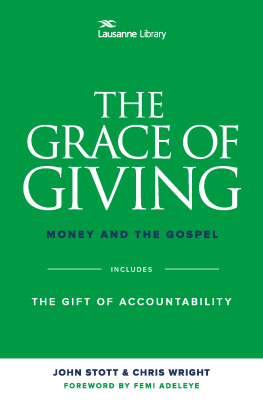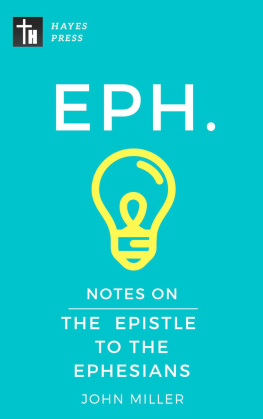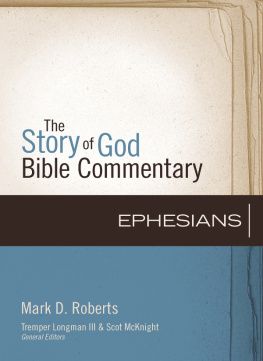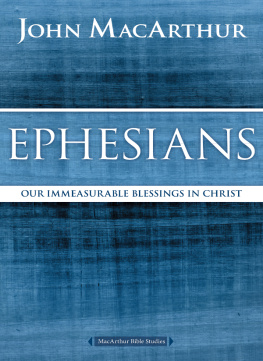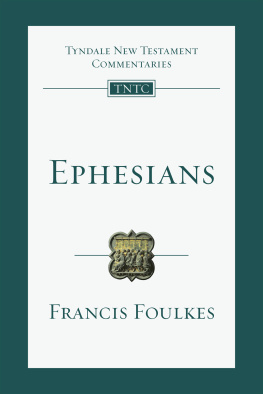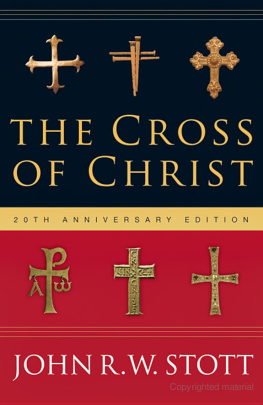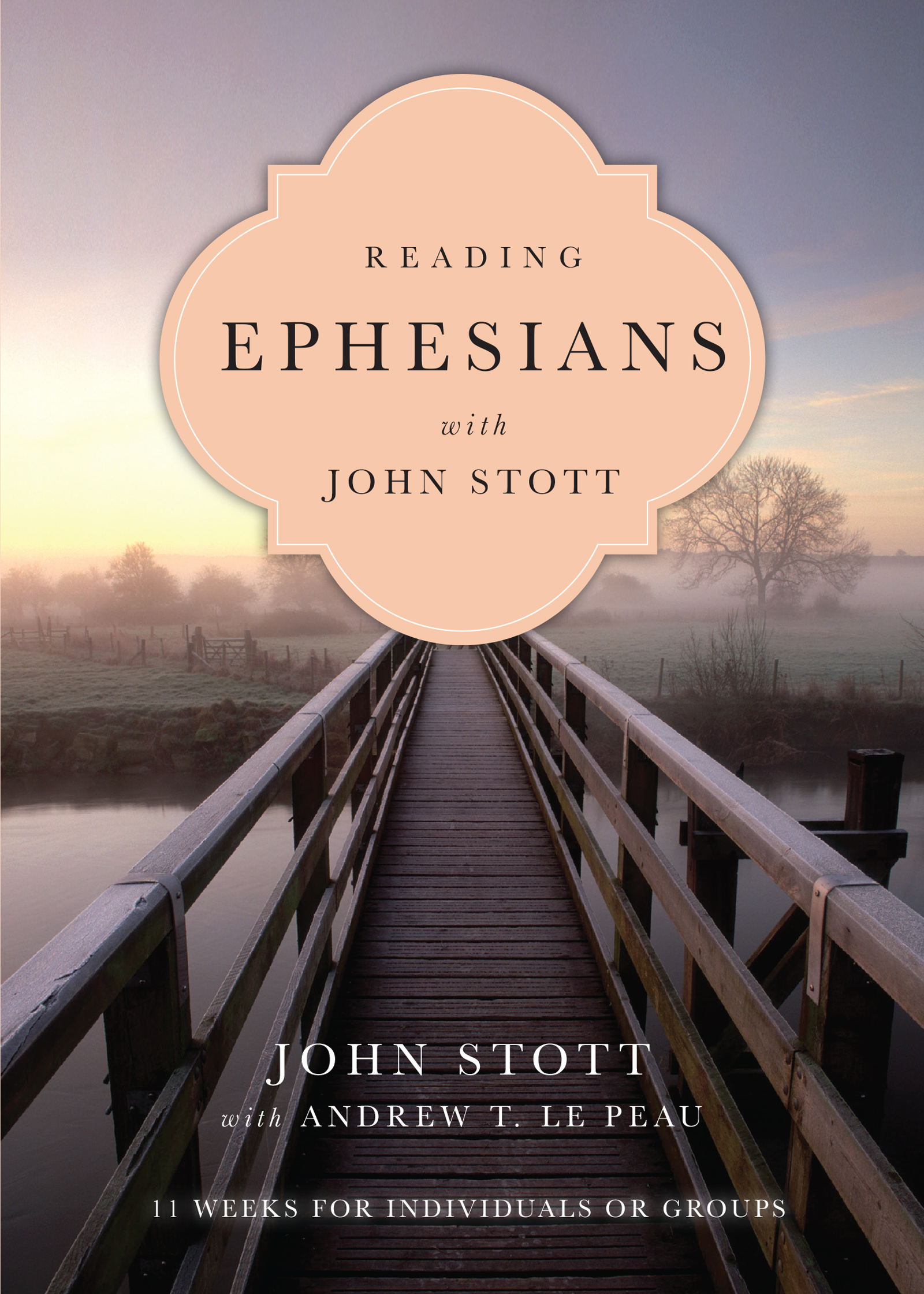WITH QUESTIONS FOR
GROUPS OR INDIVIDUALS
JOHN STOTT
with ANDREW T. LE PEAU

InterVarsity Press
P.O. Box 1400, Downers Grove, IL 60515-1426
ivpress.com
2017 John Stotts Literary Executors
All rights reserved. No part of this book may be reproduced in any form without written permission from InterVarsity Press.
This volume is abridged and edited from The Message of Ephesians 1979 by John R. W. Stott, by permission of Inter-Varsity Press, England. Some of the discussion questions are from Ephesians: Building a Community in Christ 1998 by John R. W. Stott with Phyllis J. Le Peau.
InterVarsity Pressis the book-publishing division of InterVarsity Christian Fellowship/USA, a movement of students and faculty active on campus at hundreds of universities, colleges, and schools of nursing in the United States of America, and a member movement of the International Fellowship of Evangelical Students. For information about local and regional activities, visit intervarsity.org.
All Scripture quotations, unless otherwise indicated, are taken from the Holy Bible, New International Version, NIV . Copyright 1973, 1978, 1984, 2011 by Biblica , Inc. Used by permission of Zondervan. All rights reserved worldwide. www.zondervan.com The NIV and New International Version are trademarks registered in the United States Patent and Trademark Office by Biblica , Inc.
Cover design: Cindy Kiple
Images: Mark Bauer / Trevillion Images
ISBN 978-0-8308-9241-9 (digital)
ISBN 978-0-8308-3195-1 (print)
Library of Congress Cataloging-in-Publication Data
Names: Stott, John R. W., author.
Title: Reading Ephesians with John Stott : 11 weeks for individuals or groups
/ John Stott, with Andrew T. Le Peau.
Description: Downers Grove : InterVarsity Press, 2017. | Series: Reading the
Bible with John Stott (RBJS)
Identifiers: LCCN 2017016290 (print) | LCCN 2017013140 (ebook) | ISBN
9780830892419 (eBook) | ISBN 9780830831951 (pbk. : alk. paper)
Subjects: LCSH: Bible. EphesiansTextbooks.
Classification: LCC BS2695.55 (print) | LCC BS2695.55 .S76 2017 (ebook) | DDC
227/.50071dc23
LC record available at https://lccn.loc.gov/2017016290
How to Read the Bible with John Stott

During John Stotts life (19212011), he was one of the worlds master Bible teachers. Christians on every continent heard and read John Stotts exposition of Scripture, which was at once instructive and inspiring. With over eight million copies of his more than fifty books sold in dozens of languages, it is not surprising that Time magazine recognized him in 2005 as one of the 100 Most Influential People in the World and Christianity Today called him evangelicalisms premier teacher and preacher. At the core of his ministry was the Bible and his beloved Bible Speaks Today series, which he originated as New Testament series editor. He himself contributed several volumes to the series, which have now been edited for this Reading the Bible with John Stott series.
The purpose of this series is to offer excerpts of Stotts The Message of Ephesians in brief readings, suitable for daily use. Though Stott was himself an able scholar, this series avoids technicalities and scholarly debates, with each reading emphasizing the substance, significance and application of the text.
Following each set of six readings is found a discussion guide. This can be used by individuals to help them dig more deeply into the text. It can also be used by study groups meeting regularly. Individuals in the groups can go through the readings between group meetings and then use the discussion guide to help the group understand and apply the Scripture passage. Discussions are designed to last between forty-five and sixty minutes. Guidelines for leaders at the end of this volume offer many helpful suggestions for having a successful meeting.
If you are a group member, you can help everyone present in the following ways:
- Read and pray through the readings before you meet.
- Be willing to participate in the discussion. The leader wont be lecturing. Instead all will be asked to discuss what they have learned.
- Stick to the topic being discussed. The focus is the particular passage of Scripture. Only rarely should you refer to other portions of the Bible or outside sources. This will allow everyone to participate on equal footing.
- Listen attentively to what others have to say. Be careful not to talk too much but encourage a balanced discussion among all participants. You may be surprised by what you can learn from others. Generally, questions do not have one right answer but are intended to encourage various dimensions of the text.
- Expect God to teach you through the passage and through what others have to say.
- Use the following guidelines and read them at the start of the first session.
- We will make the group a safe place by keeping confidential what is said in the group about personal matters.
- We will provide time for each person to talk who wants to.
- We will listen attentively to each other.
- We will talk about ourselves and our own situations, avoiding conversation about others.
- We will be cautious about giving advice to one another.
John Stott had an immense impact on the church in the last half of the twentieth century. With these volumes readers today can continue to benefit from the riches of the Bible that Stott opened to millions.
Introduction

Ephesians is a marvelously concise yet comprehensive summary of the good news and its implications. Nobody can read it without being moved to wonder and worship, and challenged to consistency of life. The letter focuses on what God did through the work of Jesus Christ and what he does through his Spirit today in order to build his new society in the midst of the old.
It tells how Jesus Christ shed his blood in a sacrificial death for sin, was then raised from death by the power of God and has been exalted above all competitors to the supreme place in both the universe and the church. More than that, we who are in Christ, united to him by faith, have ourselves shared in these great events. We have been raised from spiritual death, exalted to heaven, and seated with him there. We have also been reconciled to God and to each other. As a result, through Christ and in Christ, we are nothing less than Gods new society, the single new humanity he is creating, which includes Jews and Gentiles on equal terms. We are the family of God the Father, the body of Jesus Christ his Son, and the temple or dwelling place of the Holy Spirit.
Therefore we are to demonstrate plainly and visibly by our new life the reality of this new thing God has done: first by the unity and diversity of our common life, second by the purity and love of our everyday behavior, next by the mutual submissiveness and care of our relationships at home, and last by our stability in the fight against the principalities and powers of evil. Then in the fullness of time Gods purpose of unification will be brought to completion under the headship of Jesus Christ.


